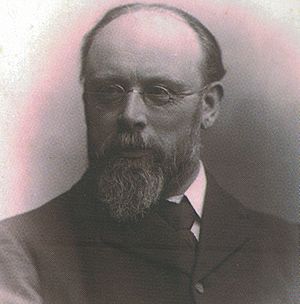James Cooksey Culwick facts for kids
Quick facts for kids
James Cooksey Culwick
|
|
|---|---|

Church Organist/Musician/Composer
|
|
| Born | 28 April 1845 |
| Died | 5 October 1907 (aged 62) Upper Mount Street, Dublin
|
| Occupation | Church organist, choral director |
| Children |
|
James Cooksey Culwick (born April 28, 1845 – died October 5, 1907) was a talented English musician. He is best known for being the organist at the Chapel Royal and for starting the Orpheus Choir, both in Dublin, Ireland. The Culwick Choral Society is named after him and continues the legacy of the Orpheus Choir today.
Contents
His Life and Music
Early Years and Training
James Cooksey Culwick was born in West Bromwich, England. When he was 14, he became a chorister (a singer in a church choir) at Lichfield Cathedral. His father was also a musician there. James learned a lot from the cathedral's organist, Thomas Bedsmore, and later became his assistant. After that, he worked as a church organist at the Church of St Chad, Lichfield.
Moving to Ireland
In 1866, Culwick moved to Ireland. He first became an organist in Parsonstown, then moved to Bray Parish Church in 1870, and to St. Ann's Church, Dawson Street in 1871. In 1881, he got a very important job: organist at the Chapel Royal in Dublin Castle. Even early in his career, people knew him as a great teacher.
Culwick loved music and wanted to share it. He started a private group called "Harmonie" for amateur singers and musicians. Later, he founded the famous Orpheus Choir. He also helped create the Feis Ceoil, which is a big music festival in Ireland. A special award, the Culwick Cup, is given in his honor at the choral competitions. He also helped set up a music society branch in Dublin with Sir Robert Prescott Stewart.
Family Life
James Culwick was married twice. His first wife was Alice Mary Harrison, who passed away in 1875. He then married Mary Richardson. He had two children:
- Arthur Culwick (born 1873), who became a clergyman.
- Florence Culwick (1877–1929), who followed in her father's footsteps and became a conductor and choir director.
His Passing
James Culwick died at his home in Dublin after being ill for about a month. He was 62 years old.
His Musical Creations
James Culwick was a talented composer and writer about music. He wrote many pieces for piano, organ, and choir. Some of his notable compositions include:
- Ballade, for piano
- Sonata No. 1, Op. 3, for organ
- Quartett für Pianoforte, Op. 7 (a piano quartet)
- The Legend of Stauffenberg, a dramatic cantata (a type of musical story).
- Nine Irish Melodies, true to their scales, for harp or piano.
He also wrote several books and papers about music, such as:
- The Study of Music and its Place in General Education
- The Rudiments of Music. An Introductory Text-book
- Handel's Messiah: Discovery of the Original Word-Book Used at the First Performance in Dublin, April 13, 1742. This writing helped solve a long-standing question about where the famous Messiah was first performed.
- The Distinctive Characteristics of Ancient Irish Melody: the Scales
Awards and Recognition
On June 29, 1893, the University of Dublin gave James Culwick an honorary Doctor of Music degree. This means they recognized his great achievements in music.
In 1909, a special memorial was placed in St Patrick's Cathedral, Dublin to remember him. It has a bronze picture of him and says: James Cooksey Culwick. Mus.Doc. Trinity College, Dublin. Born 28th April 1845. Died 5th October, 1907. A learned musician. A true artist. A good man. This tablet was put there by the members of the Orpheus Choral Society to honor their founder and conductor.
 | Toni Morrison |
 | Barack Obama |
 | Martin Luther King Jr. |
 | Ralph Bunche |

